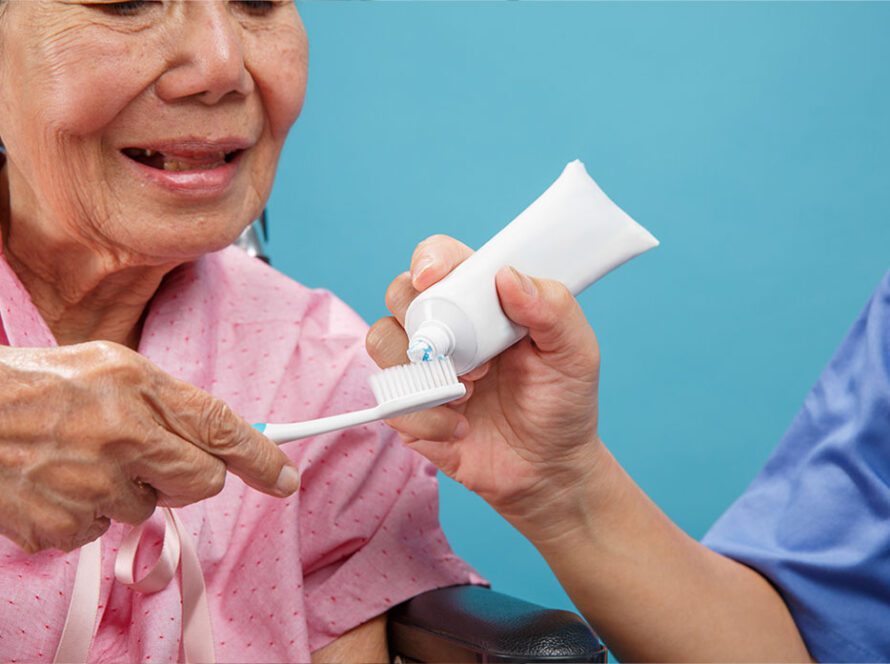As your loved one ages, there will likely be physical modifications that will need to be made to their living environment, depending on their physical needs and challenges. But if your loved one develops dementia, home modifications and adaptations create an entirely new dynamic of considerations.
People who are living with dementia begin to lose safety awareness for hazards, chemicals, sharp objects, etc. They may also forget how to safely and correctly use appliances, faucets, and other day to day items. In addition, short term memory is often affected and they can be confused with where they are living and why, and to the time of day or season of the year. Due to the changes in their visual field and perception, people living with dementia see things in a way that can be confusing, frightening, and very different from the way that we see them. Therefore it is crucial that their living environment is not only hazard free, safe and secure, but also dementia aware – modified in a way that sets them up for as much success and independence as possible.
Modifying an Environment for Someone with Dementia
General Safety Tips
- Make the space dementia aware. Take a tour of the space, looking at it with the perspective of someone with dementia. Dementia affects memory, cognitive abilities, visual field and depth perception, coordination and balance, and physical strength. Think of the space with the future in mind. Even if your loved one is still functioning well with minimal assistance, prepare their space with the future in mind.
- Beware of lighting and trip hazards. Make sure commonly used walkways (i.e., from the bedroom to the bathroom, or living room to the kitchen) are well lit and free of clutter, throw rugs, cords, or any other potential trip hazards. Changes in levels of light can be disorienting for someone with dementia. Create consistent lighting by adding extra lights in entries, hallways and areas between rooms, stairways and bathrooms. Use night lights in walkways, bedrooms and bathrooms. Place light switches at the top and the bottom of stairs. Mark the edges of steps with bright or reflective tape.
- Clear out clutter. Clutter is distracting, confusing, and stressful for someone with dementia. Less is more – and so much better – for someone with dementia. Think basic and simple.
- Look for areas that may have shadows or glares. The perception of someone with dementia is much different than ours. A dark rug may look like a hole and cause them to be afraid of falling.
- Make the space secure. People living with dementia can live in a reality that is very different from ours. They may believe they are an age much younger than what they actually are, and therefore it may not make sense why they are living in their current space. They may also feel the need to go to a former job, or pick up their children from school – who are actually adults now. Many things can trigger a desire to leave – and at any time of day or night. As your loved one declines and becomes more confused, think of how you are going to keep them secure
- Install locks out of sight. Place a latch or deadbolt either above or below eye level on all doors.
- Remove locks on interior doors to prevent the person living with dementia from locking themselves in.
- Keep an extra set of keys hidden near the door for easy access.
- Store any guns or weapons in a locked cabinet, or remove them from the hom
- Install smoke alarms and carbon monoxide detectors in or near the kitchen and all sleeping areas. Check their functioning and batteries frequently.
- Consider using: seat cushions, floor mats and bed pads that are wired to alert you when your loved one gets up or leaves a room, motion-sensor alarms outdoors, in your family member’s bedroom and the kitchen, a video monitor (some are motion-activated)
- Be prepared for emergencies. Keep a list of emergency phone numbers by all phones (and on your cell phone) and addresses for local police and fire departments, hospitals and poison control helplines.
- Keep a current photo of your loved one; update quarterly
- Put all portable and cell phones and equipment in a safe place so they will not be easily lost.
- Install secure locks on all outside doors and windows.
- Install alarms that notify you when a door or window is opened.
- Cover unused electrical outlets with childproof plugs.
- Keep valuable documents secured
- Make sure all computer equipment and accessories, including electrical cords, are kept out of the way. If valuable documents or materials are stored on a home computer, protect the files with passwords and back up the files. Password protect access to the Internet, and restrict the amount of online time without supervision.
- Designate a “danger zone.” Consider making one designated area/closet a storage place for all chemicals, cleaners, sharp, and hazardous materials that should be locked up.
- Make the space safe. Many things can become hazards for someone with dementia, things we may have never considered.
Kitchen
- Disconnect the garbage disposal.
- Install stove knob covers, or remove knobs when the stove is not in use.
- Remove vitamins and prescription drugs; store them in a locked cabinet or locked medicine case.
- Remove toxic plants, decorative fruits or refrigerator magnets that may be mistaken for real food .
- Monitor the temperature of food and water. The person living with dementia may not be able to tell the difference between hot and cold. Make sure the hot water heater is set to a safe temperature limit.
- Install child safety locks on cabinets and cupboards that contain cleaners, chemicals, appliances, or anything sharp.
- Insert a drain trap in the kitchen sink to catch anything that may become lost or clog the plumbing.
- Evaluate or secure any “junk drawers.” Ensure there are no matches, scissors, or edible (or mistaken for edible) small items.
- Unplug the microwave.
- Keep plastic bags out of reach.
- Keep all alcohol in a locked cabinet .
- Make routine inspections of the pantry and refrigerator. People with dementia may not be able to monitor expiration dates and eat spoiled, expired or raw food.
- Put certain foods out of sight; when judgment becomes impaired, a container of artificial sweetener or a jar of instant coffee crystals may seem like a good meal.
- When pet mealtimes are done, remove bowl; store pet food in a secured cabinet.
Bedroom
- Monitor the use of any electric blanket or heating pad to prevent burns or other injuries. Avoid any space heaters. If fans are used, be sure objects or fingers cannot reach the blades.
- Place seating near the bed to help with dressing
- Ensure closet shelves are at an accessible height and items are easy to reach
- Secure large furniture. Ensure that book shelves, tall dressers and large TVs are secured to prevent tipping.
- Use a night-light and be sure the walkway to the bathroom is clear with no trip hazards
- Remove throw rugs
- If the person with dementia is at risk of falling out of bed, place mats next to the bed, as long as they do not create a greater risk of accident.
- Speak with your physician about transfer or mobility aids if needed
- Be aware of your loved one’s potential reaction to mirrors. Mirrors can make the room confusing. In addition, the person with dementia may also not recognize themselves in the mirror, or process what they see, which can cause distress and anxiety.
- Consider removing the lock off your loved one’s door to be certain that no one is locked in or out.
Laundry room
- Keep all cleaning products – laundry soap, fabric softener, bleach, laundry pods, etc. – out of sight and secured in a locked cabinet
- Clean out lint screens and dryer ducts regularly to prevent fires
- Remove large knobs from the washer and dryer if necessary.
- Consider closing and latching the doors and lids to the washer and dryer to prevent inappropriate objects from being placed in the machines.
Outside
- Check for uneven surfaces or walkways; be sure stepping stones or bricks are flush with the ground and areas are well lit and free of trip hazards.
- If there is a swimming pool, restrict access by fencing it with a locked gate, covering it, and closely monitoring when in use; consider a pool alarm.
- Remove the fuel source and fire starters from any grills when not in use, and supervise use when the person with dementia is present.
Bathroom
- Consider removing the lock from the bathroom door to prevent the person with dementia from getting locked inside/locking caregivers out
- Place nonskid adhesive strips, mats or decals in the tub and shower. Try to match the color with the color of the tub/shower so the individual is not distracted. If the bathroom is uncarpeted, consider placing these strips next to the toilet, tub/shower and sink.
- Install grab bars in the tub/shower and by the toilet; or use a raised toilet seat with handles
- Use a shower stool and a hand-held shower head to make bathing easier
- Set the water heater at a safe temperature to avoid burns
- Insert drain traps in sinks to catch small items that may be lost or flushed down the drain
- Secure all medications (prescription and nonprescription) in a locked cabinet
- As your loved one’s confusion increases, consider storing all grooming products in a secured cabinet as they could potentially be ingested
- Secure toilet brush, plunger and any and all cleaning products
- Install a nightlight
- Secure small electrical appliances from the bathroom – curling irons, blowdryers, electric razors, etc
- Cover electrical outlets
- Ensure that outlets in the bathroom have a ground fault circuit interrupter (GFCI) or are protected by a GFCI circuit so they will shut off if they get wet
Living Room
- Make sure walkways are well lit and clear of clutter, cords and any trip hazards
- Remove throw rugs
- Place decals at eye level on glass patio doors, large picture windows, or furniture with large glass panels to identify the glass pane. Visual and perceptual impairments can make glass doors/panes seem like open space
- Remove controls for a gas or electric fireplace. Do not leave the person with dementia alone with an open fire in the fireplace.
- If it becomes an issue, keep the remote controls for the television, DVD player, and stereo system out of sight.
Garage/Shed/Basement
- Lock access to all garages, sheds, and basements if possible
Secure all:
- Tools
- Tackle
- Machines
- Sporting equipment
- Chemicals/gasoline/fertilizer/paint
- Secure and lock all motor vehicles/bicycles and keep them out of sight if possible
If the person with dementia does enter a garage, shed, or basement, preferably with supervision, make sure the area is well lit and that any stairs have a handrail and are safe to walk up and down
Keep walkways well lit and clear of trip hazards; make sure any overhanging items are out of reach.


